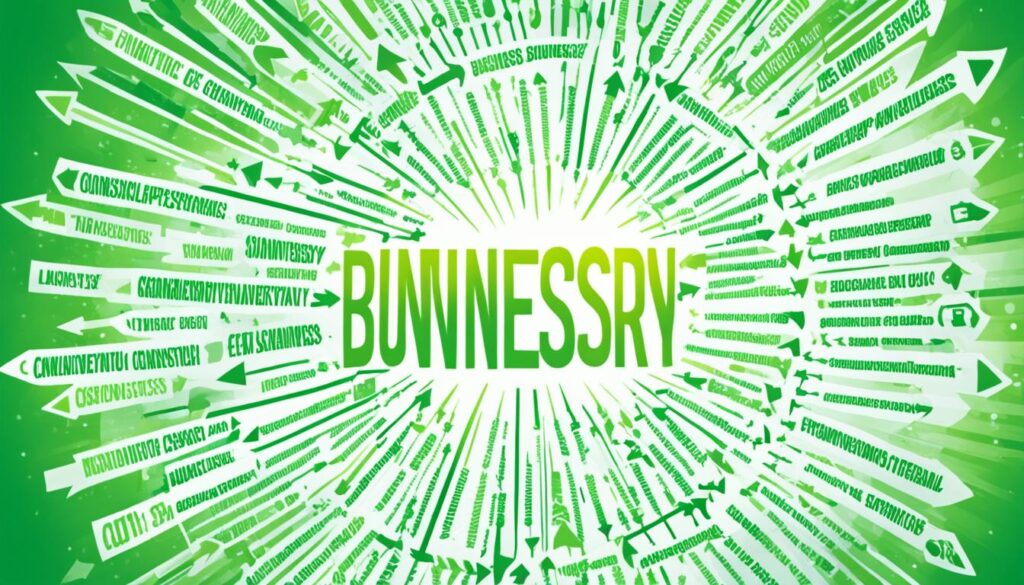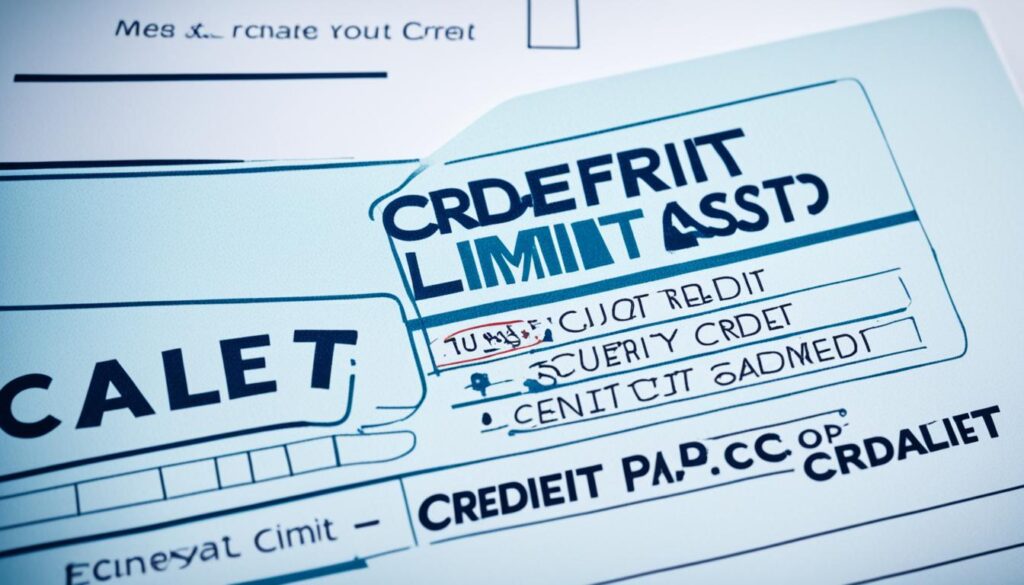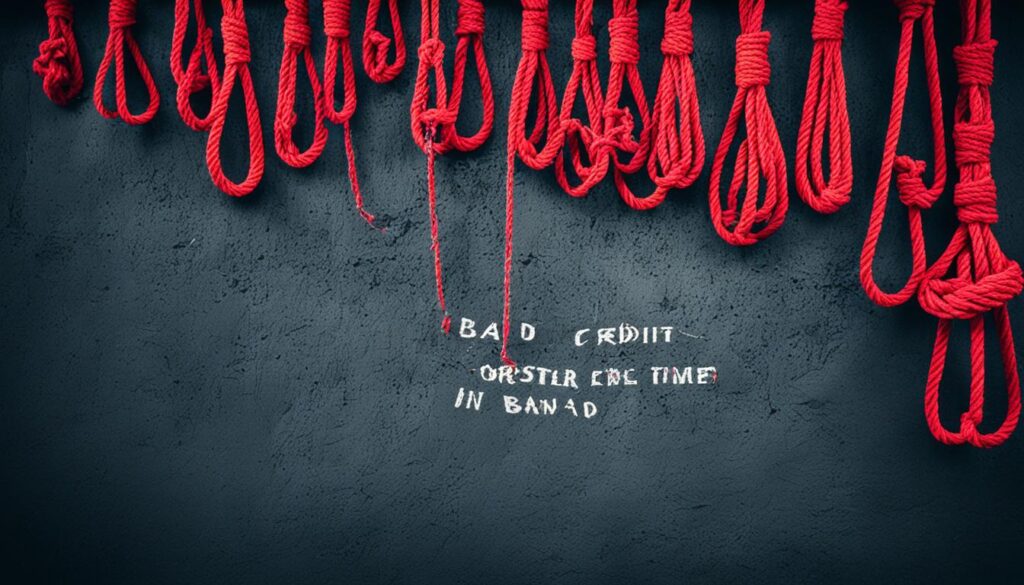A business line of credit is a type of loan that gives businesses a set amount of money. It’s like a business credit card. Companies can use the money when they need it. Unlike a loan, you only pay interest on what you take.
You can access this money through a business checking account or an app. It’s quick and easy to get the funds. This is great for paying bills fast, growing the business, or dealing with ups and downs in cash flow.
Key Takeaways:
- A business line of credit is a flexible funding solution for businesses.
- It functions similarly to a business credit card, providing access to a predetermined amount of funds.
- Interest is only paid on the amount borrowed, making it cost-effective.
- Funds can be accessed through a business checking account or a mobile app.
- A business line of credit offers companies the flexibility to meet immediate and ongoing financial needs.
Why Choose a Business Line Of Credit?
Businesses choose a business line of credit for its adaptability. As per the Federal Reserve Banks’ 2023 Survey on Small Business Credit, 43 percent of applications are for these lines. They are the most sought-after financing option by American business owners.
This type of credit provides a handy way to manage various business expenses. Companies can use it for everyday costs, pay their employees, deal with sudden expenses, and buy inventory. It gives businesses the means to handle both immediate and lasting financial needs flexibly and efficiently.

Small Business Credit Survey – Financing Preferences
“Lines of credit are the most commonly sought after by small business owners. These finances can help in the short term. But it’s key for owners to think about what they really need from a loan to make the most of this option.”
Advantages of a Business Line Of Credit
There are several benefits to using a business line of credit:
- Flexibility: Unlike term loans or fixed financing, a credit line lets you use funds as your business needs.
- Accessibility: Once you’re approved, you can use your credit line anytime. This is perfect for sudden costs or quick business chances.
- Manageable Repayments: You pay interest only on what you use. Plus, you can set up the repayments to match your revenue.
- Building Credit: Responsibly using a credit line can boost your business’s credit score. This might help in getting more funding later or better loan conditions.
To sum up, a business line of credit is a valuable tool. It adapts to your business’s financial needs, helping to keep cash flow steady and the business secure.
How Does a Business Line Of Credit Work?
A business line of credit works like a credit card. It gives you the money you need when you need it. You don’t have to use the whole amount at once.
It’s not like a regular loan where you get a big sum upfront. Instead, you can take out money as you need it. This way, you have the financial freedom to deal with urgent matters.
With a business line of credit, you only need to pay interest on what you use. This can help you manage your money better. You can use your saved cash on other important things.
“A business line of credit is a valuable tool that enables businesses to access funds when needed and only pay interest on the borrowed amount.”
As you pay back what you’ve used, you can borrow again. Also, you can keep extending your credit line, depending on your lender’s rules.
This credit line is great for managing daily costs, short-term projects, or sudden expenses. It’s a reliable way to get cash quickly when you need it.
Benefits of a Business Line of Credit
Here are the special perks of having a business line of credit:
- Flexibility: You can borrow what you need, when you need it. This helps manage your cash flow well.
- Constant Access to Funds: You can keep borrowing within your approved limit.
- Financial Control: Paying only interest lets you choose where your money goes.
- Opportunity for Growth: It provides resources to grab new chances or expand your business.
Example of a Business Line Of Credit
Now, let’s see how this works in real life:
| Business Line of Credit Details | Amount | Interest Rate | Repayment Terms |
|---|---|---|---|
| XYZ Business Line of Credit | $50,000 | 7% | 12 months |
Imagine a business owner who gets a $50,000 credit line at 7% interest. They can use this money for business needs. They make interest-only payments over 12 months.
This means they control their spending while having the cash they need. They can use the money wisely and pay it back gradually.

In the end, a business line of credit is a key tool for managing financial needs. It brings flexible funds, controlled spending, and the chance to grow your business.
Secured vs. Unsecured Business Lines Of Credit
It’s crucial to know the difference between secured and unsecured business lines of credit. A secured line needs collateral like cash or real estate. But an unsecured line doesn’t need any assets to back it up. Let’s see the upsides and downsides of each kind.
Secured Line of Credit
With a secured line of credit, businesses might get better loan terms. This includes lower interest rates. Why? Because with collateral offered, there’s less risk for the lender. So they’re more willing to give a better deal.
Having high credit limits is another plus of secured lines. Lenders might give more money because they have your assets as a guarantee. This can help companies with blemished credit scores or a shallow credit past.
The SBA’s CAPLines program is a good example of a secured credit line. It’s backed by the Small Business Administration. This extra assurance allows for more positive loan terms.
Unsecured Line of Credit
No valuable assets to put up for a loan? An unsecured line might be the way to go. It doesn’t require you to risk your assets, but it might cost a bit more in interest.
Businesses must have good credit and financial records for an unsecured line. Lenders look at your credit scores, how much money you make, and how long you’ve been around. These factors help them decide if you’re a good bet.
Keep in mind, even without collateral, lenders might want personal guarantees. Or they may check on your business assets. This is how they try to lower their risk.
The choice between secured or unsecured credit depends on your business’s situation. Think about your financial health and talk to lenders. This will help you pick the best financing path for your business.

Can You Get a Business Line Of Credit With Bad Credit?
Yes, you can get a business line of credit with bad credit. Specialized lenders exist for this purpose. They understand the challenges you face. They aim to help you even with bad credit.
Choosing this path may come with some downsides. You might get a lower loan amount. Also, you’ll likely need to repay more often and in a shorter time.
Since you’re seen as a riskier borrower, lenders offer limited funds. They also want their money back sooner. This is to protect their investment.
You can expect higher interest rates too. They’re higher than what those with better credit scores would see. It’s a measure to balance the extra risk they’re taking.
But what about unsecured lines of credit? They might be harder to get with bad credit. Unsecured credit doesn’t need collateral. However, securing it could be a challenge.
Anyway, a business line of credit can be a great help even if you have poor credit. It lets you access money when you need it. Plus, paying back on time helps you improve your credit score.
Don’t forget, shopping around for the best offer is key. Look at different lenders. Find the one with the fairest terms for you.

Benefits of Bad Credit Financing
“While bad credit financing may have certain limitations, it can still benefit businesses. By getting a line of credit, you can fund expenses and grow your business. Also, paying on time can boost your credit score over time.”
Showcasing the benefits of bad credit financing:
| Benefits of Bad Credit Financing | Description |
|---|---|
| Access to funding | Get the capital you need to cover expenses and invest in your business. |
| Cash flow management | Manage your cash flow effectively by using a line of credit when needed. |
| Opportunity for credit repair | Rebuilding your creditworthiness by making timely repayments on the line of credit. |
Can You Get a Startup Business Line Of Credit?
Getting a business line of credit for a startup might seem hard. But, online lenders make it easier. They are focusing on startups and offer flexible funds. Some only need you to be in business for six months to get you started with a credit line.
Wells Fargo is a good example of a supportive lender. They have a Small Business Advantage line of credit for startups. If you’re younger than two years but have good credit, you’re eligible. This helps startups get the money they need to keep things flowing smoothly.
The Wells Fargo credit line is very helpful for startups. It gives them the cash they need for growth. For startup tasks like paying bills or growing, it’s a solid pick. Partnering with strong online lenders like Wells Fargo helps startups use their good credit to get the cash they require.
A business line of credit changes the game for startups. It gives them financial room to tackle new chances or solve unexpected problems. This kind of credit is useful for getting new gear or handling up and down cash times. It’s a key resource for moving forward steadily.
Thanks to online lenders, getting a credit line for your startup is possible. After six months in business, start exploring your options. Look into Wells Fargo’s Small Business Advantage line of credit and similar offers. They might just have what you need for your startup’s financial growth.
Requirements for a Business Line Of Credit
To get a business line of credit, lenders look at several things. They check the credit scores of both the business owner and the business itself. They also look at how much money the business makes each year and how long it has been around.
Your credit score is really important when you want a line of credit for your business. It shows lenders if they should trust you to pay back what you owe. A high score improves your chances of getting approved and might get you a better deal on the loan.
Lenders will also check your business’s credit history. A good business credit score shows that your company is trustworthy with money.
The money your business makes every year matters a lot too. Lenders set a minimum amount your business must earn to make sure you can pay them back. This amount they require can change from lender to lender and depends on your business’s size.
How long your business has been running is another thing lenders consider. It’s usually easier for businesses that have been around a while to get a credit line than for new ones.
| Requirement | Criteria |
|---|---|
| Credit Score | Varies by lender, a healthy credit score increases approval chances |
| Annual Revenue | Meets lender’s minimum revenue requirement |
| Time in Business | Established operating history preferred; startups may have additional requirements |
Sometimes, you may also need to offer something valuable as security for a secured line of credit. This could be real estate or other investments. The collateral makes it less risky for the lender to give you credit. As a result, it could get you better loan terms like lower interest rates or more credit.
It’s worth mentioning that requirements for a business line of credit can change from one lender to another. Depending on what type of credit line you are looking for, the criteria could be different. Talking to different lenders is a good idea. It helps you understand what’s needed for your application and how to boost your chances of getting approved.
Pros and Cons of a Business Line Of Credit
A business line of credit has its good and bad points. Knowing these can help you decide if it fits your business.
Improved Cash Flow
A key plus of a business line of credit is better cash flow. It gives you access to money when needed. This helps deal with sudden costs, seasonal changes, or new chances.
Accessibility to Funds
Another advantage is easy money access. Once approved, you can use the funds any time. This is great for quick needs or growing your business without worry.
“A business line of credit gives me the flexibility to react and grow.” – Maria Rodriguez, Rodriguez Creative Solutions
Opportunity to Build a Relationship with the Lender
Having a business line of credit with a trusted lender builds a strong tie. Good handling can lead to better terms and more credit later on.
But, there are also cons to think about:
Fees
Business lines of credit often come with fees. These can be for starting, using, or drawing money out. Be sure to check what fees lenders charge to know your true cost.
Higher Interest Rates
Business credit lines might have more interest than some loans. This is because they are flexible. It’s smart to compare interest rates to see what your business can handle.
Potential for Short Repayment Terms
Business credit lines can need to be paid back quickly. You might need to make payments often. Make sure your business can keep up with these short schedules.
Thinking about these pros and cons will help you choose wisely for your business.
What to Consider When Getting a Business Line Of Credit
When looking for ways to fund your business, think about the types of expenses you have. A business line of credit is great for smaller expenses. It also ensures you always have ready access to money. Yet, if you’re making a big, one-time buy, like new equipment, a business term loan might suit you better.
Figuring out if you need a line of credit or a term loan is key. A line of credit comes in handy for businesses whose spending varies. It allows you to borrow up to a certain amount, pay it back, and borrow again. But, if you have a specific goal, like buying a new truck, a term loan that gives you the money all at once might be the way to go.
- The interest rates and fees are important to look at for both options
- Think about which option’s repayment schedule fits best with your business’s money flow
- Consider the size of the loan you need and what banks are willing to offer
- Remember to check what they’ll ask for in terms of paperwork and qualifications
Thinking carefully about these aspects and what your business requires will help you pick the best financing choice.
Comparing the Pros and Cons
Understanding the benefits and drawbacks of a line of credit versus a term loan is crucial. A line of credit gives you flexibility, letting you borrow and then pay back while only needing to cover the interest on what you’ve used. This feature can be very helpful for your budget and also in case of emergencies. Nevertheless, it usually charges more in interest and fees than a term loan.
Term loans, on the flip side, are good for singular, large purchases. You get all the money at once, usually at a fixed interest rate and with clear payment terms. This predictability aids in your financial planning. However, you don’t have the benefit of dipping into funds again like with a line of credit.
Below is a table that outlines the essential differences between a line of credit and a term loan:
| Business Line of Credit | Business Term Loan |
|---|---|
| Flexible access to funds | Lump sum amount |
| Interest paid on the amount borrowed | Fixed interest rate |
| Ongoing credit limit | Fixed loan amount |
| Draw and repay multiple times | Single repayment |
| Higher interest rates may apply | Potentially lower interest rates |
By doing your homework and carefully evaluating what your business needs, you can choose wisely. Compare the benefits and drawbacks of the available options. This way, you’ll make a decision that bolsters your business’s future and financial wellbeing.
Conclusion
A small business line of credit is a flexible way for businesses to handle short-term money needs. It helps improve cash flow and lets companies manage various costs. Finding the right lender with good rates can save a business money and help build a strong financial base.
This type of credit is great for immediate needs, managing cash ebb, and capturing growth chances. It’s easy to apply online or via a mobile app, perfect for busy business owners.
When looking at a small business line of credit, think about your financing needs. Checking out different lenders for the best deals is key. With the right choice and being financially smart, a business can enjoy the benefits of this type of credit for a long time.
FAQ
What is a business line of credit?
A business line of credit is like a credit card but for businesses. It lets companies borrow money when they need it. This can be for paying bills, employee wages, or buying things for the business.
Why choose a business line of credit?
Many businesses prefer a line of credit for its flexibility. It is among the top choices for financing, say Federal Reserve Banks. American business owners like it because it meets their short-term and long-term financial needs well.
How does a business line of credit work?
It works as a revolving line of credit. Businesses get a certain amount they can borrow. They pay interest only on what they use. As they repay what they’ve borrowed, they can use the credit again.
What is the difference between secured and unsecured business lines of credit?
A secured line of credit needs something valuable as a guarantee. This could be money, investments, or real estate. An unsecured line of credit doesn’t need a guarantee but could have higher rates. There are also SBA CAPLines, backed by a government guarantee, for secured options.
Can you get a business line of credit with bad credit?
Getting a line of credit with bad credit is possible but harder. Lenders might offer less money, charge more interest, and ask for quicker repayments. It might also limit options for secured or unsecured credit.
Can you get a startup business line of credit?
Startup lines of credit are often available online. Some only need your business to be running for six months. Wells Fargo offers one for businesses under two years if your credit is good enough.
What are the requirements for a business line of credit?
Lenders look at your personal and business credit scores, your business’s yearly earnings, and how long you’ve been running. You might need to put up something valuable if it’s a secured line. But the exact requirements can vary.
What are the pros and cons of a business line of credit?
A line of credit can help your business’s cash flow and gives you quick access to money when you need it. But, there are fees to watch out for, like annual fees and origination fees. The interest rates could be high too.
It’s not a good fit if you need a lot of time to pay back the money. You also must always keep up with your scheduled payments.
What should you consider when getting a business line of credit?
Think about what your business really needs. A line of credit is great for small to medium costs and future plans. But, if you have a specific big purchase in mind, a loan might be better.
What is a small business line of credit?
It’s a great option for businesses’ day-to-day and short-term costs. It helps with cash flow and covers various business needs. This makes it a key choice for many small businesses.


















